Scratch Upscale Black Shadow Original Design / Scratch Built
Scratch - Upscale Black Shadow {Scratch}
Contributed by Matthew Bond
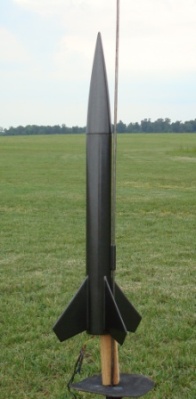
Brief:
Inspiration is a funny thing sometimes. Late one night, with all thoughts of sleep far
removed, I found myself perusing the online catalogue of Semroc Astronautics Corporation, particularly the large and
exciting selection of balsa nose cones. For those of you who have not yet indulged in this exercise I highly recommend
it, not only as a source of inspirations, but simply for a chance to be impressed by the scale of what is available. I
happened to be looking at some of the larger nose cones and as I viewed one after another, something caught my eye, a
footnote, “Upscale of BNC–55AC”. Having recently cloned two of my most favorite rockets which happened
to use that very nose cone, I found myself thinking, “What sort of scale would this work out to be”? Up until
this point in my rocketry career, I had never built or flown a rocket with anything larger than a 24mm motor
mount… Finally the motivation had arrived for my first true excursion into the world of “Mid” power.
This upscale is based on the Thrustline Black Shadow, a basic 4FNC design with what I would call
“classic” lines. It always looked right to me in terms of size, scale and line. Utilizing Semroc 225 tubing
which is 2.25” ID / 2.34” OD yields a scale factor of 1.77. Other than the heavier components and through the
wall fin mounting, the Big BS is essentially an up-scaled model rocket build.
Construction:
Most of the materials for this build were obtained from Semroc, except where noted.
The following components were used:
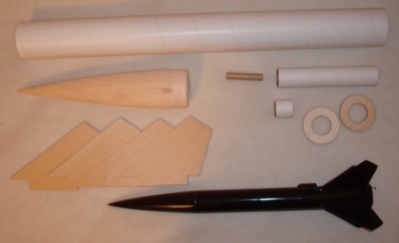
- Main Body Tube Series 225 – 18”
- Nose Cone BC-22595
- Fins 1/8” Basswood
- Motor Mount Tube Series 115 – 6”
- Centering Rings 2x CR 115/225P – Light Plywood
- Thrust Ring TR115 – heavy paper type
- Launch Lug – 1/4” x 3”
- Kevlar® Shock Cord 600#, 1/8” x 15’ flat woven Kevlar® from Uncle Mike’s Rocket Shack
- Parachute – 18” Hemispherical from Spherachutes
- 9” Round Kevlar® Chute Protector from Giant Leap Rocketry
- 1/4” Barrel Swivel from Giant leap Rocketry
- Large Screw Eye – 3/16” x 1.5”
- 29mm Aero Pack Motor Retainer
Construction of the Big BS is similar in most respects to a scratch low power build. The main difference is that I used epoxy for almost all of the construction, which meant that I had to plan my build sessions a little bit more with respect to mixing batches of epoxy and making sure I had the right pieces ready to use. I ended up mixing a lot of small batches of epoxy, and probably wasted a lot of it, but eventually I got better at judging how much I needed, and how much I could get done before each batch started to set. As I look back at this build I am sure that the Titebond wood glue I use for my low power rockets would have been more than sufficient and probably lighter overall. I had ulterior motives, however, since I was using this build as a “warm-up to my first high power rocket and wanted to practice with the techniques and materials I would be using.
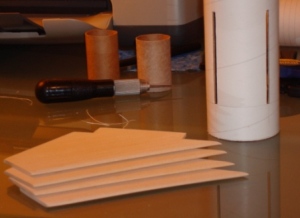 The
first official step was to cut out the fins. I used the “scale” function in Rocksim 9 to create a model of my
bigger Black Shadow, and then added through the wall tabs before printing out the new template. If you had the old fin
template you could use a copier to get the right sized fins, or if needed you could measure and scale up the dimensions
by hand. I used 1/8” basswood for the fins, cutting them out with an X-Acto knife and a metal straight edge. The
leading and trailing edges were rounded off. Next I created a wrap-around fin marking template and cut slots for the
fins in the body tube. By using a piece of metal angle as a cutting guide I was able to make pretty precise cuts.
The
first official step was to cut out the fins. I used the “scale” function in Rocksim 9 to create a model of my
bigger Black Shadow, and then added through the wall tabs before printing out the new template. If you had the old fin
template you could use a copier to get the right sized fins, or if needed you could measure and scale up the dimensions
by hand. I used 1/8” basswood for the fins, cutting them out with an X-Acto knife and a metal straight edge. The
leading and trailing edges were rounded off. Next I created a wrap-around fin marking template and cut slots for the
fins in the body tube. By using a piece of metal angle as a cutting guide I was able to make pretty precise cuts.
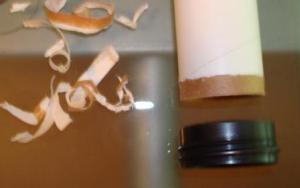 When
I planned this build I never expected I would fly anything larger than the AeroTech 29/40-120 Hobbyline reload case,
and so I sized the motor tube accordingly. I had decided to use an Aero Pack retainer, but when I did a fit check of
the base I could not get it on the end of the motor mount tube. Eventually I peeled off a couple layers of paper and
got a good fit. With the retainer set in place (but not glued) I marked to location of the forward centering ring. Next
I filed a shallow notch on the inside of the centering ring to allow the shock cord to pass underneath it. Normally I
would just tie the shock cord around the motor mount, but since I didn’t want to interfere with the TTW fin tabs,
I decided to epoxy the shock cord tail flat against the motor mount tube.
When
I planned this build I never expected I would fly anything larger than the AeroTech 29/40-120 Hobbyline reload case,
and so I sized the motor tube accordingly. I had decided to use an Aero Pack retainer, but when I did a fit check of
the base I could not get it on the end of the motor mount tube. Eventually I peeled off a couple layers of paper and
got a good fit. With the retainer set in place (but not glued) I marked to location of the forward centering ring. Next
I filed a shallow notch on the inside of the centering ring to allow the shock cord to pass underneath it. Normally I
would just tie the shock cord around the motor mount, but since I didn’t want to interfere with the TTW fin tabs,
I decided to epoxy the shock cord tail flat against the motor mount tube.
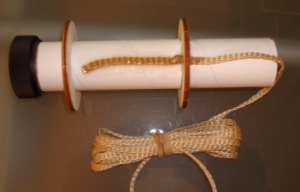 With
the forward centering ring and shock cord glued in place I swabbed a generous amount of epoxy inside the body tube and
slid the motor mount into place using the aft centering ring (dry fit) to keep everything straight. An hour or so later
I came back to check on things and something caught my eye through one of the fin slots… I had forgotten to check
the position of the shock cord tail when I installed the motor mount and of course it had managed to line up right
under one of the fin slots. Luckily I was able to pry the motor mount loose, clean everything up and re-install it
without too much trouble. Lesson learned.
With
the forward centering ring and shock cord glued in place I swabbed a generous amount of epoxy inside the body tube and
slid the motor mount into place using the aft centering ring (dry fit) to keep everything straight. An hour or so later
I came back to check on things and something caught my eye through one of the fin slots… I had forgotten to check
the position of the shock cord tail when I installed the motor mount and of course it had managed to line up right
under one of the fin slots. Luckily I was able to pry the motor mount loose, clean everything up and re-install it
without too much trouble. Lesson learned.
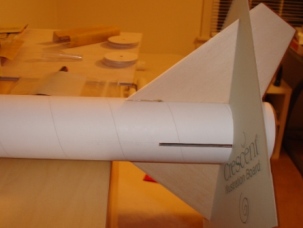 While
the motor mount was drying, I cut out a fin alignment template from mat board. Once again, I used the aft centering
ring to keep the motor tube aligned as I glued the fins in place (being careful not to accidentally glue it in) but
after the second fin was installed that was no longer necessary. After all 4 fins were installed I proceeded to add
both internal and external fillets. Once the filleting work was done, the aft centering ring was permanently installed,
and the launch lug was glued in place and filleted. I have read accounts of flyers in humid climates that have
experienced paper launch lugs swelling to the point where they will no longer fit on a launch rod. To hopefully avoid
this problem, I also treated the inside of the launch lug to a coating of epoxy, applied with a q-tip.
While
the motor mount was drying, I cut out a fin alignment template from mat board. Once again, I used the aft centering
ring to keep the motor tube aligned as I glued the fins in place (being careful not to accidentally glue it in) but
after the second fin was installed that was no longer necessary. After all 4 fins were installed I proceeded to add
both internal and external fillets. Once the filleting work was done, the aft centering ring was permanently installed,
and the launch lug was glued in place and filleted. I have read accounts of flyers in humid climates that have
experienced paper launch lugs swelling to the point where they will no longer fit on a launch rod. To hopefully avoid
this problem, I also treated the inside of the launch lug to a coating of epoxy, applied with a q-tip.
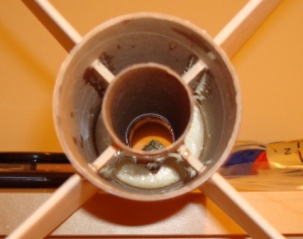
To prepare the wood surfaces for finishing I used a couple of different methods. The fins got a single coat of thinned down Elmer’s Wood Filler. The beautiful balsa nose cone from Semroc was treated with MinWax Wood Hardener. Initially I had been impressed with how well the wood had soaked up the hardener, but was less impressed a day later when most of it seemed to have seeped back out of the wood, forming a heavy pattern of droplets on the surface. I was even more unimpressed when I discovered that the hardener did not seem to want to cure, and after many failed attempts to sand the surface smooth, I put the nose cone away. Finally after almost 3 weeks, the wood hardener had cured to the point that I was able to sand the nose cone more or less smooth and then apply a coat of thinned down wood filler the finish the job. The rocket was then primed and painted gloss black to match my original Black Shadow. Note: After it’s ill fated first flight (described below) the Big BS was re-finished using Rust-Oleum Metallic Black paint and Future Floor Finish as a clear coat which work together very well.
Some final assemble steps were completed after finishing. The Aero Pack retainer base was installed on the motor mount tube using J-B Weld, and the screw eye was installed in the nose cone by screwing it most of the way in, removing it, adding a large dollop of epoxy and screwing it all the way down, with additional epoxy applied around the eye on the surface of the wood. Finally, the shock cord was fished out of the motor tube, and tied to the nose cone. A loop was tied in the shock cord about 10 inches below the nose cone to act as an attach point for the parachute.
Flight:
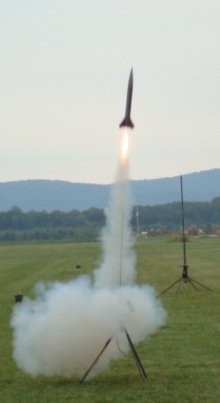 Prepping the Big BS for flight is simple. Using reload hardware with the Aero Pack retainer is as easy as
it gets, just insert the motor and screw down the retaining cap. All of the AeroTech single use motors I have flown
require a little more prep, in the form of gluing the provided thrust ring in place on the motor casing and then
loading it as described before. The 9 inch round Kevlar®
heat shield is looped to the shock cord, and easily wraps around the parachute (18 or 24 inch) providing a snug but not
tight fit in the body tube. After one false start (due to a motor assembly error…) the Big BS finally took to the
sky on an AeroTech F20-7W Econojet. The boost was fast and a little into the wind. The chute deployed nicely and the
rocket came back close to the pads for what appeared to be a perfect first flight. The excitement was short lived
however when I retrieved the rocket to find one of the fins split along the grain, all the way down through the root.
There were no impact marks on the nose cone so I can only assume it happened during landing. The fin was repaired using
medium CA glue. The Big BS has since been re-finished, and has flown a total of 7 flights to date with great success.
The F40 and G38 are the motors of choice so far and eventually I will fly it on a G64 just to say I did. Since I could
only attribute the first flight damage to landing impact, I also upped the parachute to a 24” hemispherical and
have since had no issues at all during recovery.
Prepping the Big BS for flight is simple. Using reload hardware with the Aero Pack retainer is as easy as
it gets, just insert the motor and screw down the retaining cap. All of the AeroTech single use motors I have flown
require a little more prep, in the form of gluing the provided thrust ring in place on the motor casing and then
loading it as described before. The 9 inch round Kevlar®
heat shield is looped to the shock cord, and easily wraps around the parachute (18 or 24 inch) providing a snug but not
tight fit in the body tube. After one false start (due to a motor assembly error…) the Big BS finally took to the
sky on an AeroTech F20-7W Econojet. The boost was fast and a little into the wind. The chute deployed nicely and the
rocket came back close to the pads for what appeared to be a perfect first flight. The excitement was short lived
however when I retrieved the rocket to find one of the fins split along the grain, all the way down through the root.
There were no impact marks on the nose cone so I can only assume it happened during landing. The fin was repaired using
medium CA glue. The Big BS has since been re-finished, and has flown a total of 7 flights to date with great success.
The F40 and G38 are the motors of choice so far and eventually I will fly it on a G64 just to say I did. Since I could
only attribute the first flight damage to landing impact, I also upped the parachute to a 24” hemispherical and
have since had no issues at all during recovery.
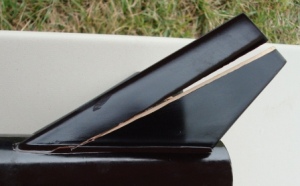
Summary:
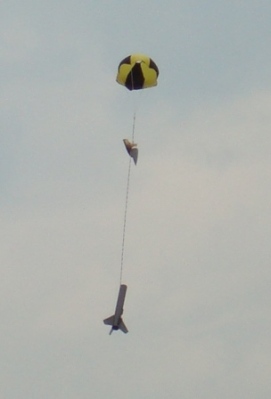 The
original Thrustline Black Shadow is an outstanding design, a great performer, tough and very versatile. The Big BS
upscale follows in those footsteps nicely. It’s a good looking rocket that can handle a wide range of motors,
won’t get too far out of sight and keeps coming back for more. Thanks to Semroc for providing the inspiration
(i.e. nose cone)
The
original Thrustline Black Shadow is an outstanding design, a great performer, tough and very versatile. The Big BS
upscale follows in those footsteps nicely. It’s a good looking rocket that can handle a wide range of motors,
won’t get too far out of sight and keeps coming back for more. Thanks to Semroc for providing the inspiration
(i.e. nose cone)
Pros: Well balanced design, very versatile flyer.
Cons: None, go build one.
Other:
There really isn’t any good reason to put a thrust ring in a 29mm motor mount. All the
re-loadable hardware and most of the single use motors on the market have some kind of thrust ring either incorporated
in their design, or included for later installation. Don’t limit yourself… Oh that new CTI G80 Skidmark…
 |
 |
Flights
Sponsored Ads
 |
 |











